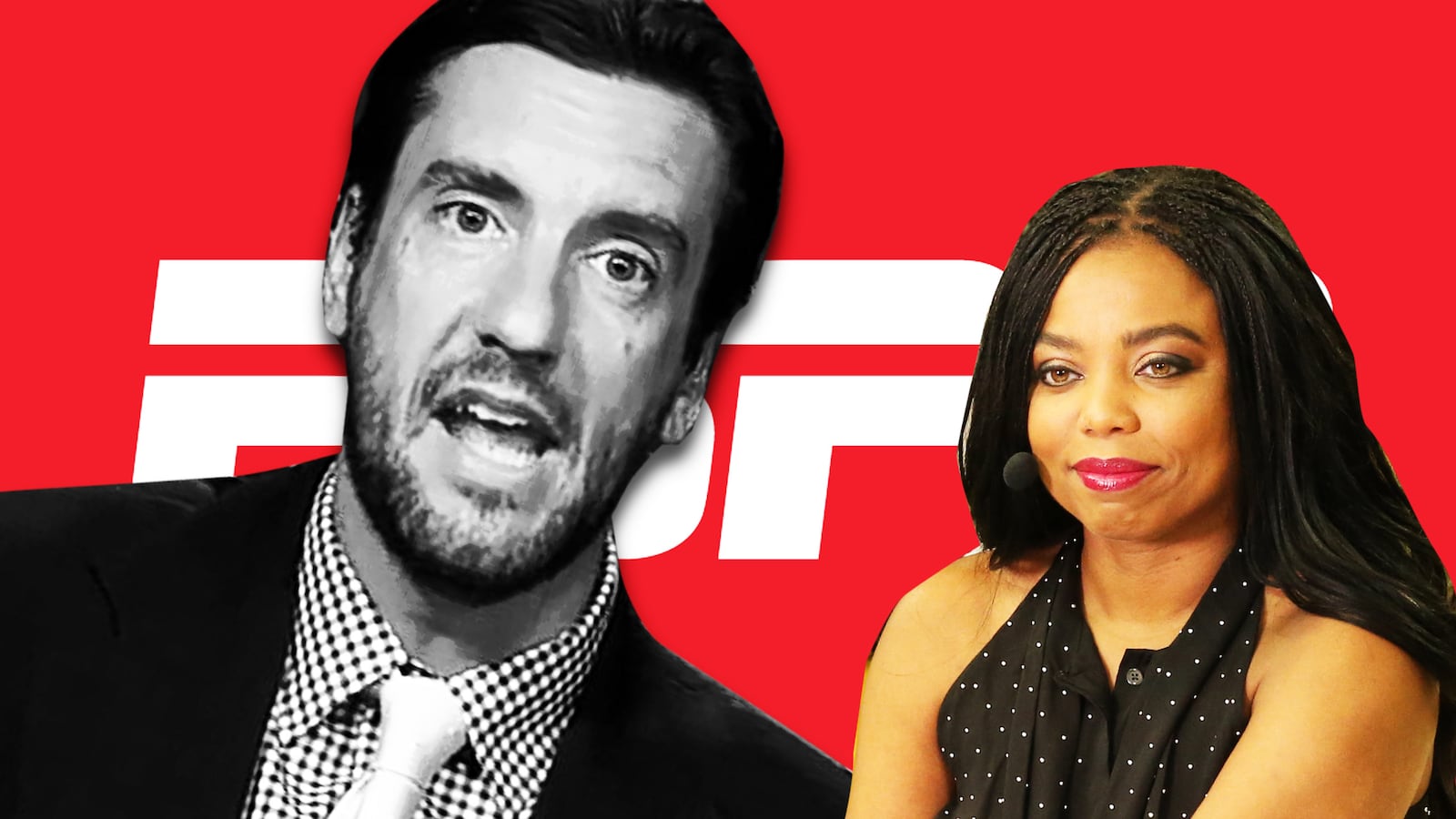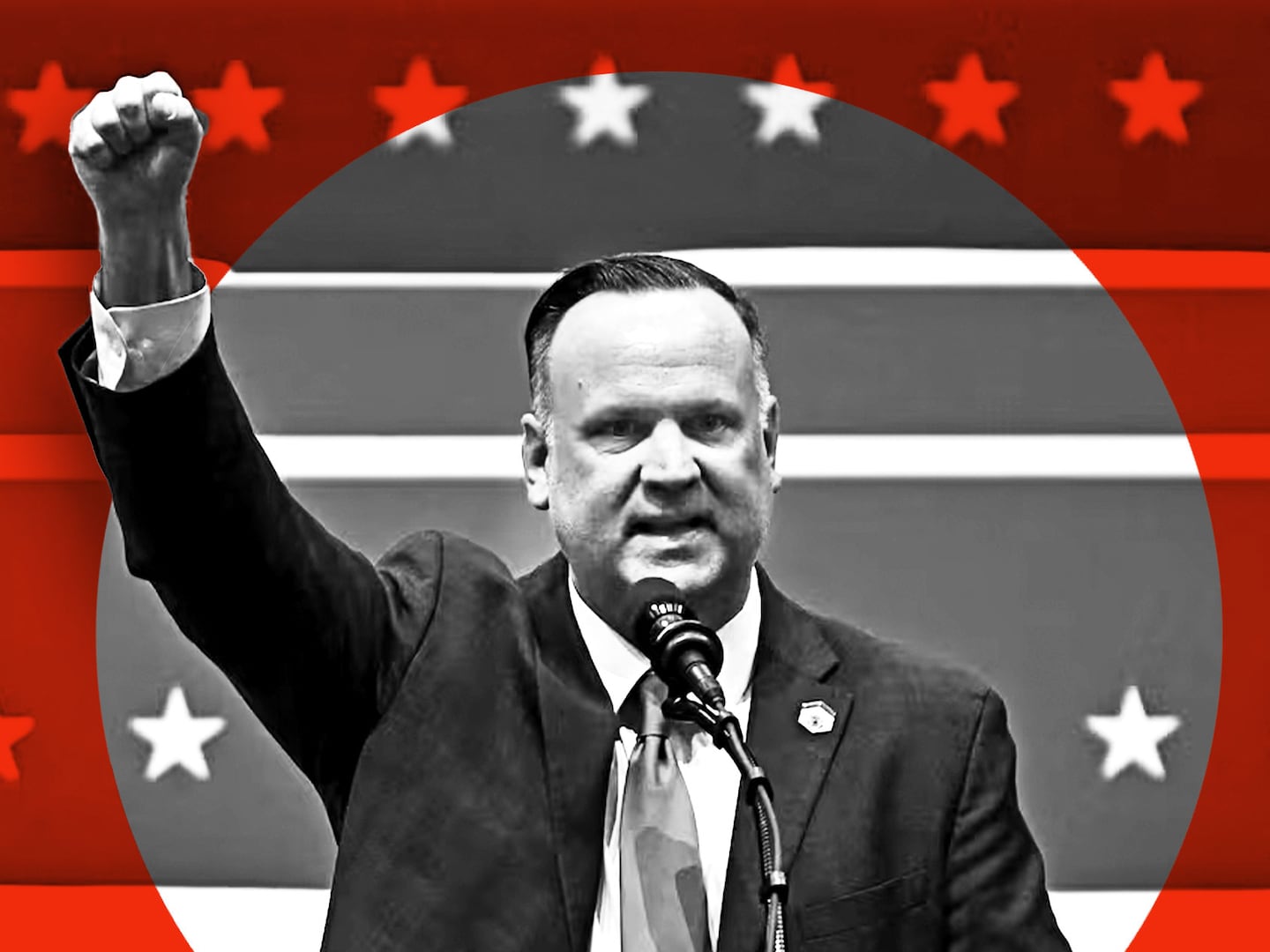At Wednesday’s White House press briefing, press secretary Sarah Huckabee Sanders was asked about ESPN’s Jemele Hill calling President Trump a “white supremacist” who has “surrounded himself with white supremacists” and is "an unfit, bigoted, incompetent moron" who is "unqualified."
In response, Sanders said Hill should lose her job. “I think that’s one of the more outrageous comments that anyone could make, and certainly something that I think is a fireable offense by ESPN,” she said.
In order to arrive at the patently ludicrous point where the White House press secretary is telling a major media company whom it should and should not employ, ESPN had to step on the exact same rake as it did after Charlottesville.
Days after the murder of activist Heather Heyer and amid an ongoing and fiercely contested debate over the removal of Confederate monuments, the company yanked an announcer named Robert Lee from a low-level college football game at the University of Virginia based on a misplaced fear that he’d be mocked online.
When the inevitable online backlash to the decision from all sides of the political spectrum inevitably kicked into gear, ESPN attempted to appease its critics by unpacking its reasoning. The move encouraged those same critics to double down and then declare victory, while the story pinged around the news cycle far longer than necessary.
Then, as now, the person chiefly responsible for stoking the madding crowd was Clay Travis.
Late on Sept. 11, after seeing Hill’s comments, Travis spotted a target-rich environment. The Fox Sports Radio host and owner of the site Outkick the Coverage, took to Twitter to say that calling someone a white supremacist was as grave as an accusation of pedophilia, that Hill’s tweets show ESPN “hates you if you vote Republican,” and that ESPN was unfairly coddling Hill, while a Republican would be treated in a very different manner.
The next day, Travis continued his attacks, appearing on Periscope to definitively assert that Trump is “not a white supremacist” and say “he isn’t a bigot,” citing minority voting results in the 2016 election and the presence of Cabinet members Nikki Haley and Elaine Chao as evidence. Travis also added that Hill’s worries about Trump were misplaced. Instead, he advised her to concentrate on the real threat to her existence—other black people—all while ensuring that this became A Story.
Shortly before Travis began broadcasting, ESPN said in a statement:
Yes, according to ESPN’s social media guidelines, Hill seems to have strayed over the line. Previously, ESPN barred employees from discussing politics at all, but in 2017, that’s a near impossibility. Now the guidelines state that political commentary must be “related to a current issue impacting sports,” and even then, ESPN employees should “avoid personal attacks and inflammatory rhetoric.” Hill’s tweets check off both boxes.
Late Wednesday night, after avoiding social media for more than 24 hours and failing to address her comments on the 6 p.m. edition of SportsCenter, Hill issued a statement clarifying that her Trump tweets reflected her “personal beliefs” only and expressing regret that they painted ESPN in an “unfair light.” ESPN responded by saying the network “accepted her apology.”
But all of this was totally unnecessary and a major tactical error. The matter could have been handled internally, and there was zero reason for ESPN to announce that Hill had received a thorough talking-to, let alone publicly distance itself from her remarks, because nothing it said would ever satisfy Travis and those who agree with him.
Why? Look how Travis twisted ESPN’s statement to his advantage. In his mind, the reprimand was somehow an indication that ESPN actually approved of Hill’s statements, even if the company said the exact opposite. Had ESPN fired or suspended her, it’s not hard to imagine Travis using that as brickbat to batter ESPN too. A self-described “First Amendment absolutist,” Travis wrote after Curt Schilling was fired by ESPN, “The idea that corporations should somehow be connected to the opinions of their individual employees” on social media is “manifestly ridiculous.”
And yet, when it came to Hill, Travis didn’t think so.
If this all reads as so much intellectual dishonesty and an utter lack of consistency, it should. This is by design. As Deadspin noted, Travis and others are cribbing straight from the Gamergate playbook. This is how culture wars will be waged for the foreseeable future, especially online. The complaints that are lodged, always at peak volume, will be untethered from reality, and the entire “debate” will be shot through with harassment, threats, and doxing.
Giving an inch only serves to insulate and validate the hashtagging mob, and spur them to demand further capitulation, because they’re not making good faith arguments. Any attempt to respond in good faith or reason with them only ends up serving as more grist for the mill.
This is how some possibly inflammatory tweets were able to ascend all the way to the White House briefing room. As was the case when ESPN tried to explain why Robert Lee had been yanked from the Charlottesville game, patiently laying out why the decision wasn’t powered by political correctness, the company’s statement on Hill reads as if the network thinks those on the right will rationally assess the facts at hand and come galloping back to the Worldwide Leader.
They won’t. Regardless, Travis and his ilk just want to extract a pound of flesh and would have done so no matter how ESPN reacted. Acquiesce in any way—as ESPN did—and Travis won’t stop hammering away, keeping the “controversy” in the news cycle, to the point where it becomes a national story, because ESPN is nothing more than a series of easily struck nails to him.
The only one who benefits from this paradigm is Travis. On Tuesday, he snagged yet another appearance on Tucker Carlson Tonight, where he again whinged about ESPN’s perceived lurch to the political left —on a day when it hung an employee out to dry and possibly opened her up to an increased deluge of racially charged abuse —while increasing his Q rating and maybe selling a few more “MSESPN” T-shirts in the process.
In an interview with BuzzFeed that was published in May, Mike Soltys, ESPN’s vice president of corporate communications, said the low-bore anger at ESPN is constantly simmering in what he called the “Twitter echo chamber.”
Despite Solty’s accurate assessment, ESPN doesn’t seem to comprehend that the “echo chamber” can’t be mollified or reasoned with, and the heat won’t ever be turned down, not with the Clay Travises of the world ready to profit from ESPN’s unforced errors, not on this particular battleground, and definitely not when ESPN, a massive, small-c conservative, corporate entity, can’t begin to fathom the rules of engagement, let alone realize it’s a fight it won’t ever win.






